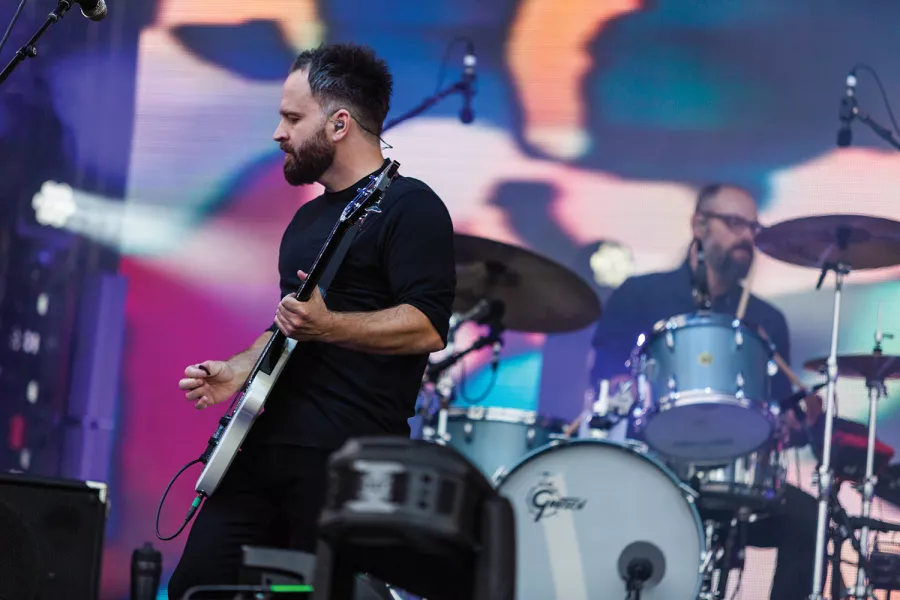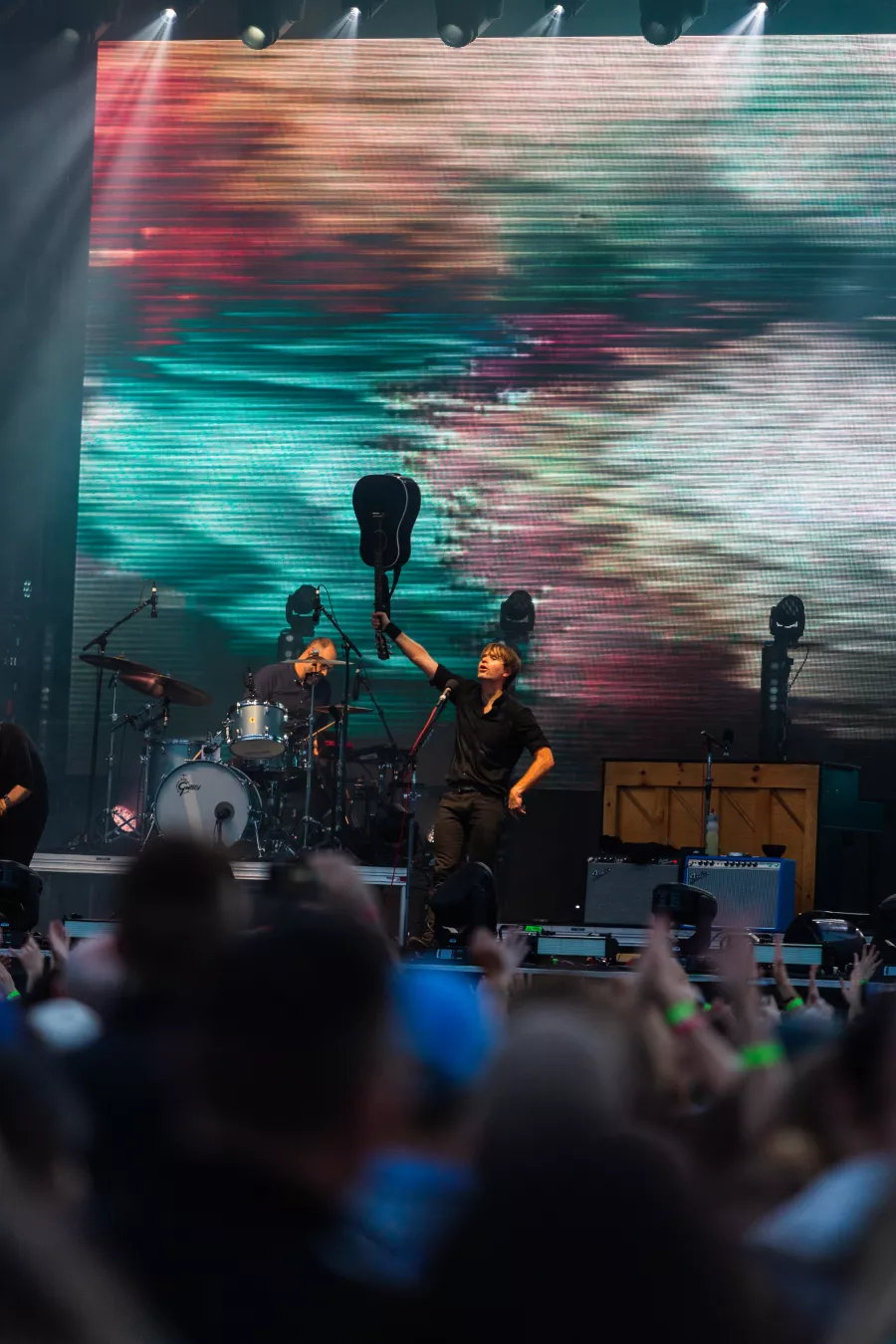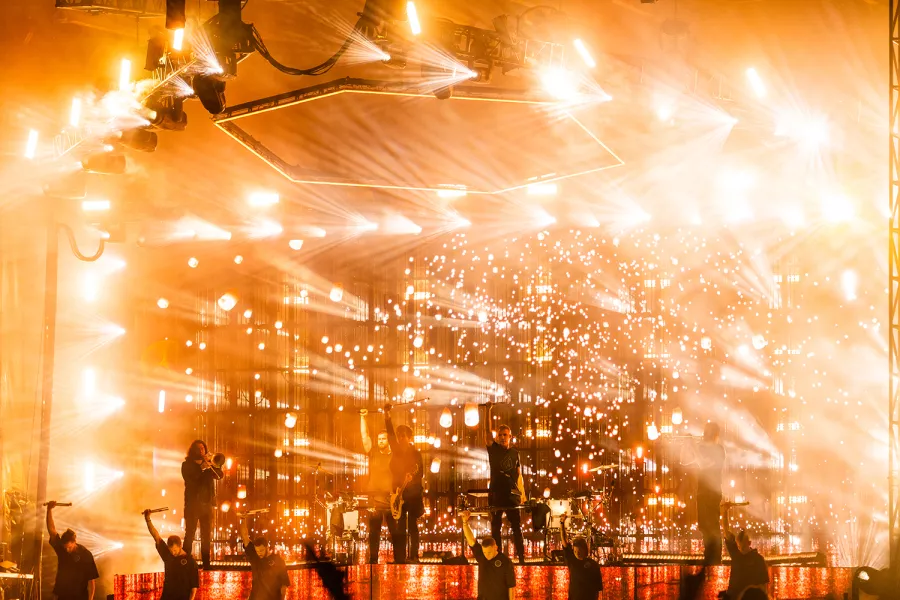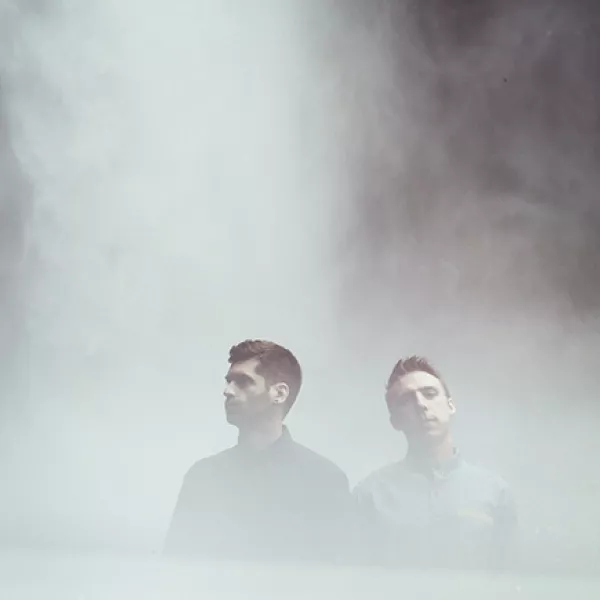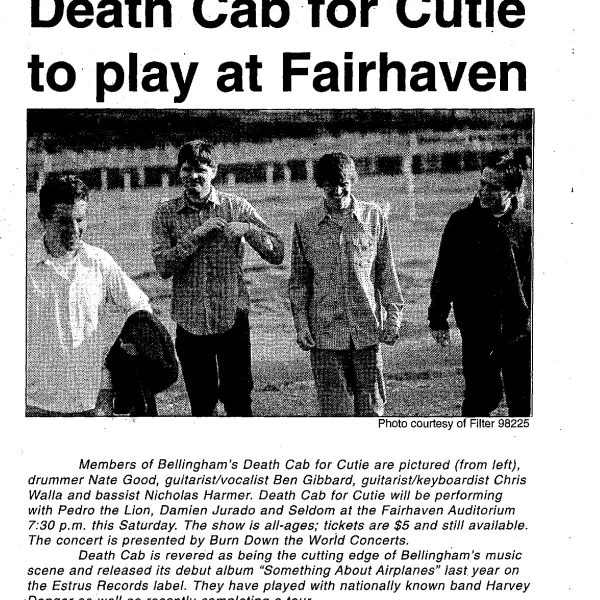As the editor of What’s Up! magazine, I’ve chronicled Bellingham’s music scene for more than two decades, watching this town nurture many exciting, young bands.
The most famous acts from Bellingham, Death Cab for Cutie and ODESZA, came home to perform at Civic Field May 18 in Double Major, the biggest show in the city’s history.
The bands are so different, you probably wouldn’t find this line-up on very many stages anywhere else in the world. But in Bellingham it makes perfect sense. Both bands are tightly woven into the city’s music history, and Bellingham is a part of their history, too.
I felt like I was a part of something’
Death Cab for Cutie had something special right from the start. In 1997, Western student Ben Gibbard, ’98, B.S., environmental science, released the demo tape “You Can Play These Songs With Chords,” under the name Death Cab for Cutie, recorded by Chris Walla at Gibbard’s rented house on Ellis Street. The tape created a buzz around town, so Gibbard assembled a band with Walla on guitar, Nick Harmer, ’98, B.A., English, on bass (at the time he was in another band with future DCFC drummer Jason McGerr), and Nathan Good on drums.
“From the moment we first played together, it was like no other band I’d been in,” Gibbard says. “We sounded good and were on the same page right from the beginning.”
For Gibbard, Bellingham’s music scene was an incredible source of inspiration. “For the first time in my life, I felt like I was part of something. I felt like I was part of a real scene.” He added, “When I moved to Bellingham in 1994, I moved to Bellingham knowing that the Mono Men were from there. The Posies were from there. Bands that people cared about in the world that had started or lived in that town. You can never underestimate the motivational power of that.”
Death Cab’s local and regional following grew. Seattle quickly fell in love with the band, especially after the release of “Something About Airplanes” in August 1998. Within a year, the band moved to Seattle and soon saw stardom. But Ben’s love of Western and Bellingham has never diminished. “I have nothing but wonderful memories of our formative years there,” he says.
Iron Street summer
ODESZA began when Harrison Mills, ’12, B.A., design, and Clayton Knight, ’12, B.S., physics, were introduced by a mutual friend, Sean Kusanagi, ’12, B.A., English – creative writing, in the later part of their Western education.
They immediately connected over their love of weird electronic music. After graduation they decided to spend the summer in Bellingham making music together. “We spent that summer on Iron Street, inside that house, hanging out drinking, enjoying the sun and making music,” Mills says.
That summer’s creative burst would change their lives. In the fall, the duo self-released “Summer’s Gone,” a light and intriguing electronic album using real instruments as often as possible. Within days, hundreds were listening online through Soundcloud, then thousands. Mills and Knight had not even played their first show; that would come later in November at the Wild Buffalo.
Western and the Bellingham music scene were huge inspirations. “Being surrounded by folk music, the indie scene really played a large role in what we were listening to,” Mills says. “The music environment here—I got introduced to so many weird and cool things from people in that school.”
Nine months after graduation, the duo moved to Seattle, keeping their key Western connections that would continue to help shape ODESZA. Their friend who introduced them, Kusanagi, has played guitar for all three albums and works on creative/video direction. Michelle Gadeken, ’11, B.A., design, helps with album and packaging design, while Luke Tanaka, ’11, B.A., design, produces video for live shows.
“They’ve been part of our success,” Mills says. “We’ve worked with these people every day since college.”
Before the show, Harrison expressed excitement about coming back “home.” “Honestly, I haven’t been more nervous in a while,” he said with a laugh, “I’m just really excited because we’ve wanted to do this for so long.”
‘We’re Death Cab for Cutie from 1138 Ellis’
Bellingham was really excited, too. Fans began arriving hours early in hopes of getting a spot close to the stage.
Bellingham’s LipStitch, playing only their fifth show, kicked things off with their energetic guitar pop sound. They cranked through five songs for the sparse but growing crowd, making the most of their 20-minute set. Montreal’s Robotaki followed, weaving through electronic waves and uplifting beats.
Then Seattle’s Chong the Nomad played a thrilling 30-minute set, with quirky, interesting songs featuring some non-electronic instruments such as ukulele and harmonica.
Two hours and 15 minutes into the show, it was go time for Death Cab. With no fanfare, the band came out and went right into “I Dreamt We Spoke Again” off their latest release “Thank You For Today.” The energy in Civic Field turned from excited to euphoric as the band that got its start all those years ago in Bellingham had come back home to celebrate. The excitement flowed through the band as they played with an extra spark in their sound. The crowd danced, sang and cheered throughout the set, reciprocating the love and excitement.
Over the next 90 minutes, the band played songs from their 20-year career, mixing in historically loved numbers and more recent songs. The crowd sang their hearts out to all of them. Early set highlights included “Gold Rush,” their first single off the most recent album, as well as “Pictures in an Exhibition” from “Something About Airplanes,” and “Crooked Teeth” of 2005’s “Plans.”
At one point Gibbard announced, “We’re Death Cab for Cutie from 1138 Ellis Street!” The crowd cheered. The band also played “Movie Script Ending,” which Gibbard described as a love letter to Bellingham. Written soon after the band moved to Seattle, the song professed how much Gibbard missed the town and everyone in it.
Ultimate fan favorites included “What Sarah Said” and a beautiful solo acoustic version of “I Will Follow You Into the Dark,” followed by the full eight-minute version of “I Will Possess Your Heart.” The crowd was filled with joy as Death Cab played “Expo ’86,” “Northern Lights,” “Cath,” and “Soul Meets Body.” They ended with a spine-chilling version of
“Transatlanticism,” a perfect moment for a band that’s meant so much to Bellingham’s music history.
Perfection in music and lights
As the sun set, the ODESZA experience began. The music is only part of their live set; lights and imagery are as much of the show, with every note and light driven to perfection. The crowd played their part, screaming their excitement.
A space theme—featured throughout their recent tour—including images of satellites and planets was projected on the massive screen at the back of the stage. On the risers stood two digital instrument stands with kick drums, mirroring each other.
A recorded snippet about a Russian cosmonaut built the tension, only to slowly fade two minutes in as ODESZA’s music perfectly met the imagery. Then, a trombone player on one side and a trumpet player on another appeared on the risers, and a sublime horn wave layered through the building music. Lights danced across the stage and into the audience, and Harrison and Clayton came out slowly, hands raised in the air holding drum sticks. The lights quickly cut and ODESZA began playing an intense rhythm on the drums with stage lights perfectly synched to the edgy electronic beats. As more lights hit the stage, a six-person drum line slowly appeared on the main stage. The tension continued to rise with more music and beats flowing through the speakers. A thrilling three and a half minutes from the start, the sound dropped out for a second, then blasted into a sensory overload with a majestic blue background, lights peering every-where as “Bloom” kicked into full dance mode.
With an encore of “Don’t Stop” and “Falls,” the final sound reverberated throughout Civic Field—and much of Bellingham. The nearly 12,000 attendees filed out of the stadium, full of joy and pride in what Bellingham music can do.
Bellingham buzz
The emotion was not lost on the bands.
“We looked at each other on stage and I was flooded with memories of Bellingham. It was really humbling and really satisfying, in a really deep way. I wasn’t expecting that, it was really emotional getting off stage,” Death Cab for Cutie’s Harmer says. “We kept telling ourselves it’s just going to be another show.”
But, they knew it was so much more. On the way to the show, Harmer passed by 1138 Ellis. “You drive around the corner and you’re at Civic Field. It’s hard to get my head wrapped around it. It felt very surreal.”
